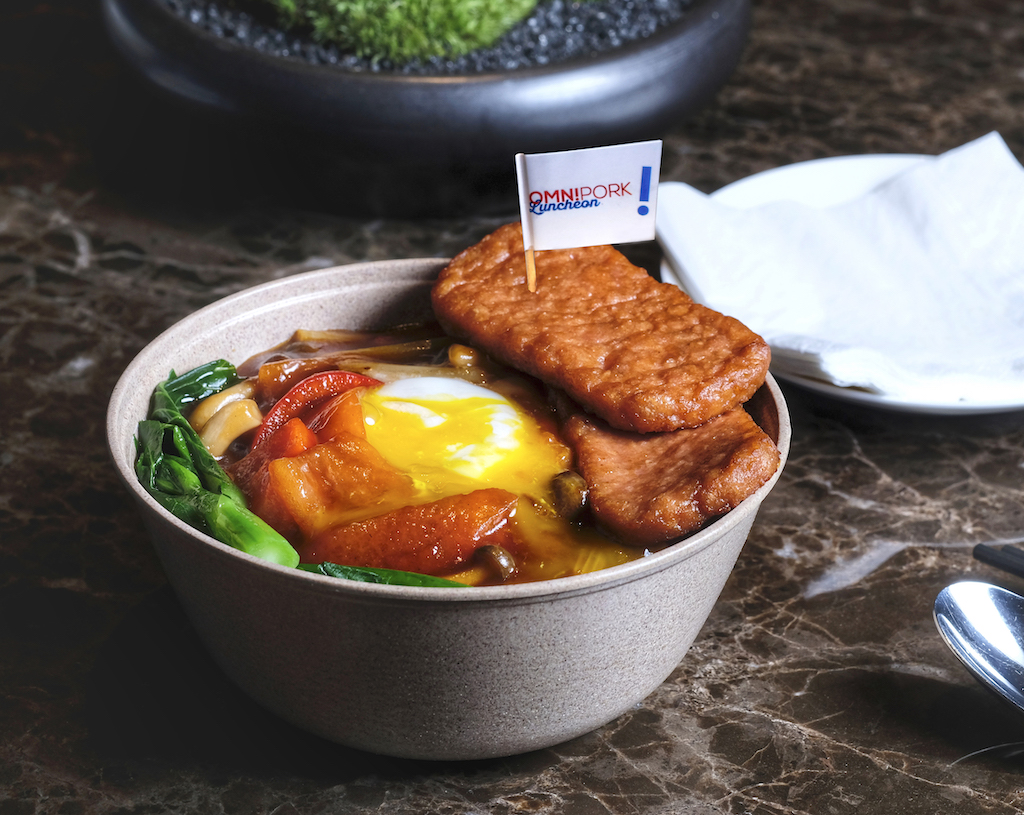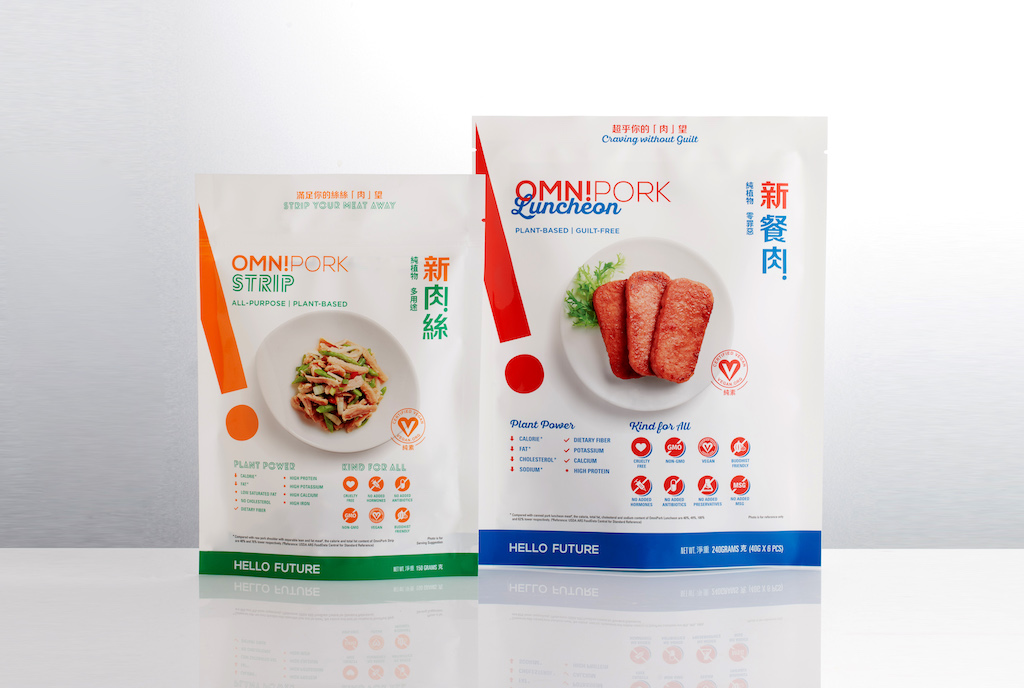6 Mins Read
Update: This article was updated to reflect that Omnipork would be in 40,000 POS locations by the end of the year, and to confirm that Ming Court will begin serving the new Omnipork Luncheon and Omnipork Strip Dishes in July.
It’s been almost two years to the day since Green Monday launched Omnipork, the groundbreaking vegan pork alternative that has proven to be Asia’s most successful homegrown plant-based meat product, earning its title among the world’s leading foodtech 2.0 product pantheon such as Beyond Meat.
Just a week after Hong Kong’s most well-known dumpling brand Wanchai Ferry rolled out plant-based Omnipork dumplings at price parity with conventional meat, Green Monday is flexing its boundary-pushing chops yet again: the plant-based pioneer has just unveiled Omnipork Luncheon Meat, the world’s first luncheon meat made entirely from plants. The ubiquitous canned meat is popular across Asia with sales of over 400 million units forecast for this year. The company is also debuting Omnipork Strip, a plant-based alternative to traditional pork shoulder.
Omnipork’s original product is made of shiitake mushrooms and a proprietary blend of pea, soy and rice protein. It looks, cooks and tastes just like conventional minced pork, at a fraction of the animal versions’ cholesterol levels and environmental footprint, which has been a runaway success by any standards. The product is used by Michelin chefs and home cooks alike, present in food service leaders like Bafang Yunji and Starbucks, sold in major regional supermarkets and endorsed by countless celebrities. It is now sold in Hong Kong, Macau, mainland China, Taiwan, Singapore, Thailand and Canada and will be in 40,000 point of sale locations by the end of the year.
Read: Where to eat the best Omnipork dishes in Hong Kong
Omnivores and herbivores alike have praised the pork mince alternative for its versatility and almost tailor-made application to Asian cuisine dishes. From Wanchai Ferry frozen Chinese dumplings to Cantonese dim sum, Thai larb and Vietnamese rice paper rolls, Omnipork has been used to replace almost every pork-containing comfort food dish found in Asia.
Until now, there had yet to be a replacement for the canned processed pork meat commonly known across the globe by the Hormel Foods Corporation Spam brand– and the significance of launching a healthier, plant-based version of luncheon meat can hardly be overstated. While Hormel has hinted at investing in the plant-based sector over the coming years and while there are a few vegetarian Spam products, as of yet there is no 100% vegan version available on the market that we could find, making Green Monday’s product a world first.

Luncheon meat: an Asian staple
Since landing in Asia after the Second World War via US soldiers, who popularised its consumption, the shelf stable, versatile and cheap pork staple has appeared in every type of regional dish from fried, baked, boiled to braised.
In Korea, the no-frills canned ham is eaten in stews and fried in batter. In Japan, spam appears in onigiri. In the Philippines, spam is enjoyed in the famous garlic fried rice dish known as sinagang.
In Hong Kong, it is known as “luncheon meat” and is almost always featured on breakfast menus at local cha chaan tengs alongside noodles and a fried egg, or sandwiched between thickly sliced toast. Hong Kongers love luncheon meat so much that almost 70% of respondents in a recent Ipsos survey indicated that they ate it at least once a month.
Speaking about the company’s expanding product range at the ‘Unveiling the New OMNI’ launch event, Green Monday’s founder and CEO David Yeung told the socially distanced room of reporters that “Omnipork changed the game, but Omnipork Luncheon is a disruption that is long overdue.”
Yeung also shared that 46% of Hong Kong people now know about Green Monday as of their latest Ipsos survey, and a record 34% – that’s 2.5 million people- identify as flexitarian eaters.

The processed meat is so popular in Asia that industry forecasts expect annual sales to exceed 400 million cans (1.1 billion cans globally) this year. Last year, Chinese consumers alone spent more than US$460 million on the meat, quickly followed by Japan, South Korea and India.
Green Monday’s version is made from soybeans, wheat, beetroot and coconut oil, making it entirely plant-based though not gluten-free.
An increasingly health-conscious Asian consumer base
Despite the popularity of the food, concerns about the health risks of consuming luncheon meat have been on a steady rise.
“Luncheon meat is a food that everyone in Asia has a love-hate relationship with,” said Yeung.
According to the World Health Organisation (WHO), eating just one slice a day increases the risk of colorectal cancer by 18% and that at least 34,000 cancer-related deaths each year globally are directly attributable to the overconsumption of processed meats. Swarmed by public health campaigns, consumers have become increasingly wary of the impact of consuming luncheon meat, with 72% of Hong Kongers alone unsettled by the carcinogenicity of the food.
Omnipork Luncheon targets exactly these concerns. It contains zero cholesterol, no carcinogenic nitrates, 49% less fat and reduces the sodium content by 62% compared to traditional canned pork meat.
“Eating isn’t just about filling up our stomachs and absorbing the daily nutrition we need. It’s also about satisfying our cravings. So I am very excited to finally provide a healthier plant-based alternative,” Yeung said.
The current coronavirus pandemic and wave of livestock diseases is likely to propel consumer interest in the healthier alternative even further. From the outbreak of African swine fever that inundated traditional pork supplies to news about Covid-19 outbreaks in meat slaughterhouses, consumers are now prioritising food safety and health more than ever before. As Yeung shared during the launch, “coronavirus is not the first disease and won’t be the last to affect us unless we change our diet”.
More than Spam: debuting Omnipork Strip

Green Monday will additionally roll out Omnipork Strip, a protein-rich plant-based version of pork shoulder, a common meat ingredient incorporated in dishes such as vermicelli noodles, Shanghainese fried noodles and with preserved vegetables.
“OmniPork Strip is suitable for almost every dish and is even better when paired with OmniPork, allowing chefs to curate an infinite variety of plant- forward dishes,” said David Yeung.
Like the original Omnipork vegan mince product, Omnipork Strip offers a winning nutrition profile– it is 76% lower in fat, contains no added hormones or cholesterol and boasts an impressive 18.6 grams of protein per 100 gram serve.
Starting in July, both Omnipork Luncheon and Omnipork Strip will be served at the prestigious Michelin-starred Chinese restaurant Ming Court in Hong Kong, as well as Green Monday’s own all-vegan eatery Kind Kitchen in a range of classic Cantonese cha chaan teng-style dishes. Retail packs will be available to consumers in Hong Kong starting from July too.

Rebranding to OmniFoods
Alongside the launch of its new vegan luncheon meat product, Green Monday has announced the rebranding of its food tech arm that created Omnipork, Right Treat, to OmniFoods.
“Changing our name will allow the company to align to its global development in a more prominent and consistent manner,” explained Yeung. “The Omni series is omni-purpose in application, especially targeting omnivores alongside people who follow a plant-based diet. It is possible for anyone to be a part of this plant-based movement and create a better future for the earth and yourself.”
All images courtesy of Green Monday.



